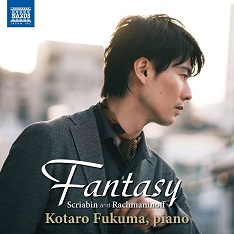Mit einer sehr poetischen Etüde von Scriabin steigt der jetzt vierzigjährige Kotaru Fukuma in sein Fantasy-Programm ein, um danach mit der Etude Pathétique auch ein höchst virtuoses, aber nie auf vordergründige Brillanz angelegtes Spiel zu zeigen. Das gelingt ihm abwechslungsreich in den noch recht frühen Werke Scriabins, die noch bar der mystifizierenden Entwicklungen sind, welche die Musik später einschlagen sollte. Hier sind wir näher bei Chopin, und das ist in diesen Interpretationen gut herauszuhören.
Im weiteren Verlauf des Programms sind Rachmaninovs Cinq Morceaux de fantaisie zu hören, in denen Fukuma all die Sensibilität zeigt, an die man bei diesem feinfühligen Pianisten gewöhnt ist. Die einzelnen Stücke schimmern in zarten Farben, mit Stimmungen, die von traurig-melancholisch bis zur quirligen Spiellust des Polichinelle reichen.
In der 2. Sonate (in ihrer ersten Fassung) bleibt Fukuma jedem aufrauschenden, hoch dramatischen und perkussiven Klang fern. Bei ihm hebt die Musik ohne Härte ab, entschwebt quasi in Richtung Scriabin. Die Kontraste zu den vitaleren Passagen werden dadurch nur noch aufregender. Mit großartigen, spannungsreichen Melodiebögen bringt Fukuma den Flügel zum Singen.
Kotaru Fukuma, now forty years old, begins his fantasy program with a very poetic etude by Scriabin, followed by the Etude Pathétique, a highly virtuosic piece that is never played just for superficial brilliance. He succeeds in doing this in a varied manner in the still quite early works of Scriabin, which are still devoid of the mystifying developments that the music was to take later. Here we are closer to Chopin, and this can be heard well in these interpretations.
Later in the program, we hear Rachmaninov’s Cinq Morceaux de fantaisie, in which Fukuma displays all the sensitivity to which one is accustomed with this sensitive pianist. The individual pieces shimmer with delicate colors, with moods ranging from the sadly melancholy to the lively playfulness of Polichinelle.
In the 2nd Sonata (in its first version), Fukuma stays away from any rushing, highly dramatic and percussive sound. With him, the music takes off without harshness, virtually floating off in the direction of Scriabin. This only makes the contrasts with the more vital passages more exciting. With magnificent, suspenseful melodic arcs, Fukuma makes the grand piano sing.


















